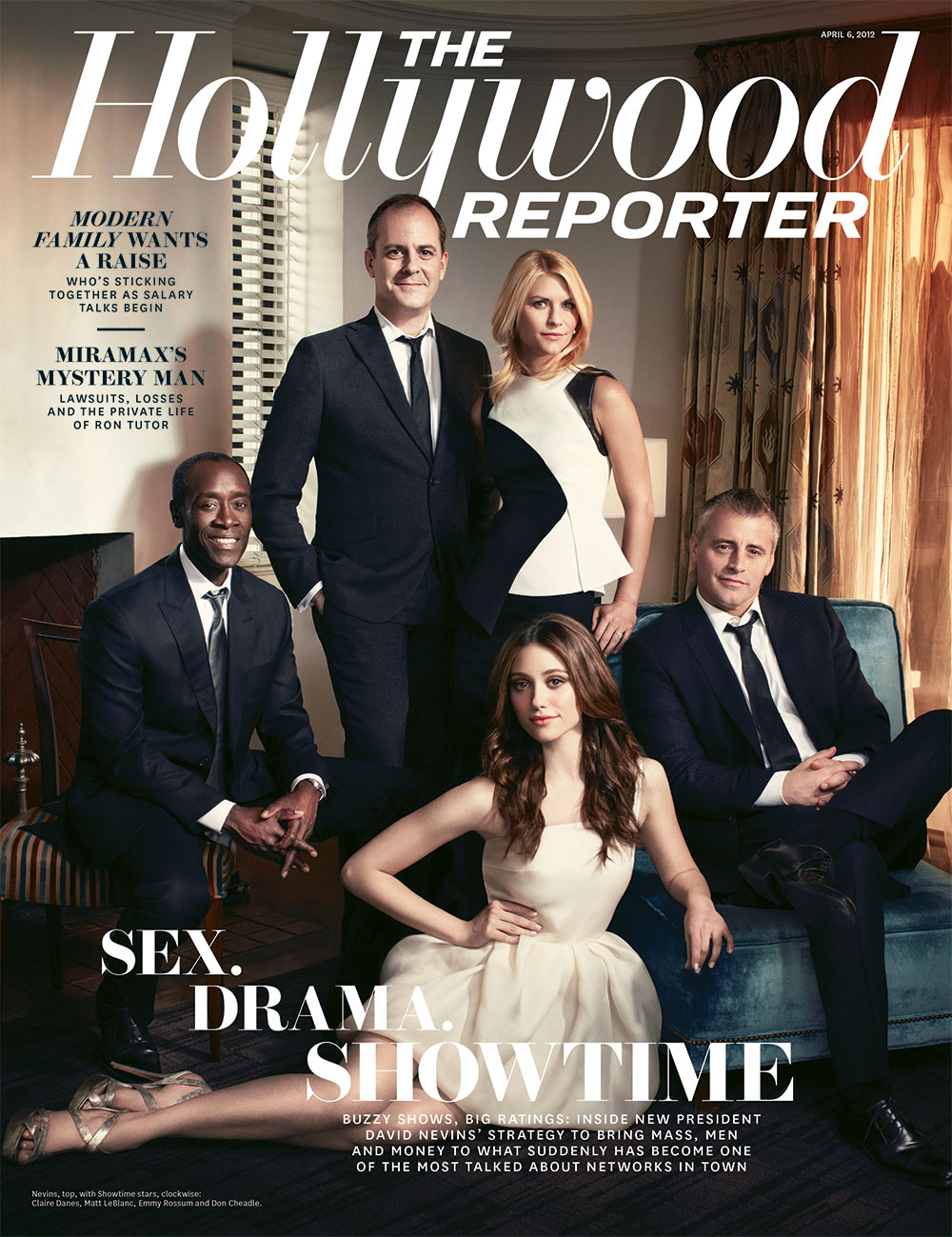“Dear Team,” the October note from Paramount Global executive David Nevins began. “I’m writing this morning, so you hear this news from me … the time is right for me to step down from my post atop the premium group at the end of the year.”
The decision was neither rash nor entirely unexpected. And while he made no mention of friction in the memo, sources close to Nevins suggest his role had become increasingly murky, and he was eager to have complete control of the Paramount+ streaming service, not simply a sliver here and there.
When Nevins and I meet at the Sunset Tower Hotel two months later, for the second installment of THR‘s “Table for Two” column, this one an exit interview, he isn’t interested in rehashing the decision to depart after 12 years. He does concede that his title had become nebulous and unwieldy — the chairman and CEO of Paramount Premium Group and the chief creative officer of Paramount+ Scripted Series (save for the onslaught from Yellowstone creator Taylor Sheridan) — and that he “never really had [greenlight] power at Paramount+.” Still, he insists he’s leaving with a sense of gratitude, particularly to Paramount Global chair Shari Redstone, who he claims empowered him even as his purview kept changing. “I’ve had a good seat at the table every step of the way,” says Nevins, who, in his latest incarnation, was responsible for Showtime, the Paramount Television Studios and BET, on top of his Paramount+ duties. “It’s not like I’ve just been a pinball reacting to mandates from above.”
Though Nevins was asked to stay on until Dec. 31, he’s not been particularly hands-on since, as he puts it, he “came out of the closet.” There’s an “art to figuring out where I’m still needed,” he says over lunch — Tower Bar chopped salads, his with chicken and a tomato soup starter — and, just as important, where he’s not needed. Meanwhile, his fiefdom was immediately redistributed, with Paramount Media Networks president Chris McCarthy assuming his duties at Showtime, where he’s wasted no time reevaluating the pipeline, according to panicked insiders. McCarthy’s boss, Paramount Global CEO Bob Bakish, has said Showtime would “lean into franchises,” though what exactly that entails is unclear. He also said that while the brand “still matters,” it no longer made sense to “run Showtime as a 100 percent stand-alone organization.”
At this stage, Nevins would only be guessing as to the role Showtime will play in the future. He’s spent the past two months traversing the world, wrapping things up and saying his goodbyes. He was in the Netherlands, the U.K. and, most recently, New York, where his parting words, which amounted to some version of, “Make sure to lead an interesting life,” left many nostalgic. In between, he attended the Harvard-Yale football game — he has kids at both, though the Amherst grad rooted for Yale and his documentary filmmaker wife, Andrea, a Harvard alum, cheered for her alma mater — and has carved out time to catch up with friends and former collaborators. He’s even dug into books like Anna Karenina for the first time. “When else would I have time to read a 900-page book?” he says, then immediately worries that he’ll come off as pretentious.
Outside of a late December trip to Korea with his wife and three children, at least two of whom have Hollywood ambitions (one even interned at rival HBO), Nevins doesn’t know what comes next. At 56, he hasn’t ruled out another corporate gig, though given the seismic shifts in the entertainment industry, he’s actively exploring more entrepreneurial paths, too. And despite all the belt-tightening happening around him, he’s reasonably optimistic about the future. “We’re clearly deep in the midst of a shakeout where fewer things are being ordered and spending of all sorts is being scrutinized, but I think we’ll come out of that cycle in a healthier place and I think we’ll come out of it relatively soon. I don’t want to guess a quarter, but within 2023,” he says, noting that that timeline accounts for the very real possibility of a midyear writers strike.
“Certainly the streaming market isn’t endless, but the desire for great premium TV and movies is as strong as it’s ever been,” he continues. “So, there’s no demand problem — it’s a business model problem, and that’s getting shaken out right now.”

The last time Nevins and I were together at the Sunset Tower was for a Hollywood Reporter cover shoot early in his decade-plus run. At that time, he’d only recently replaced Bob Greenblatt as the entertainment president of Showtime, where his then-boss, CBS Corp. CEO Leslie Moonves, had hired him hoping he’d replicate the success he’d had at NBC (with The West Wing and ER), Fox (24) and Imagine TV (Arrested Development, Friday Night Lights). And in short order, he had, infusing the premium cable network with big, buzzy hits, beginning with the Emmy-winning Homeland. “Sex, Drama, Showtime,” read the THR cover, which featured Nevins and his assemblage of hitmakers: Homeland‘s Claire Danes, Episodes‘ Matt LeBlanc, Shameless‘ Emmy Rossum and House of Lies‘ Don Cheadle.
In the years since, his role evolved considerably. He added the CBS broadcast network to his portfolio following the abrupt ouster of Moonves in 2018; then, after the 2019 merger of CBS and Viacom, a new studio, a network and a portion of the streamer. In the past year, he’s been very focused on expanding Showtime’s global footprint via SkyShowtime, even as its domestic muscle has weakened in the face of growing competition. Nevins says being asked to wear so many different hats kept him engaged; in fact, he’s not so sure he would’ve stuck around otherwise.
Few things have changed more dramatically over the course of his run than the costs associated with making high-end TV. A series that used to cost him $4 million to $5 million to produce, Nevins tells me, now runs between $8 million and $10 million. “We’re paying too much for the return on investment and what the market can sustain,” he argues, noting that Showtime and, before that, Imagine TV had done it “more efficiently than anybody else. Honestly, I made shows that survived because they were cheap. Friday Night Lights hung on because it was famously the least expensive drama of its era, and the whole idea with Arrested was, ‘Spend your money above the line, not below.’ In general, I like not being the most expensive guy on the block.”
In that time, what passes as a premium show and who gets to greenlight it have changed, too. “I wasn’t seriously looking at sci-fi back then,” he says. “Or I wasn’t thinking so much in terms of other worlds, and perhaps we’ve gotten a little too far into other worlds, but we’ve expanded the field of what we can create and who’s allowed to create it, and that’s a good thing.” While he still has greenlight authority at Showtime, even if he often relies heavily on the opinions of his colleagues, he’s one of several decision-makers at the streamer, which, to the horror of creatives everywhere, has become increasingly common. Nevins is pragmatic about the committee approach. “Because the greenlight committee wasn’t just invented, it’s been discussed going back to the 1970s after one too many art house films in the Easy Rider, Raging Bulls era, and then they decide they need storytellers to make more decisions and go back,” he says. “So, you’re watching the pendulum swing now, but it doesn’t move inexorably in one direction. There’s a cycle and a countercycle, and people always forget that.”
As our coffees and a plate of warm chocolate chip cookies arrive, Nevins is reflecting on the more rewarding aspects of the gig, which are mostly show-specific. There was Homeland, which helped telegraph to the industry what it was that Nevins wanted to do with the network, and big, broad hits like Billions and Ray Donovan that ensured he’d get to keep doing it. He’s still tickled by the affection audiences have for Ray Donovan, considering that when Nevins first heard Liev Schreiber’s name for the role, he naturally assumed they’d have to change it to a Jewish character. “Liev said to me, like, ‘Don’t be an idiot, I’m an actor,’ ” he recalls with a laugh. “And to the rest of the world, he’s completely convincing as an Irish Boston guy, so I guess he was right.”
Halo (at Paramount+) and Ghosts (at CBS) are two properties that he’s immensely proud to have played a part in, which is not to suggest that Nevins always bet well. He readily admits that he was initially (and unnecessarily) concerned that Yellowjackets, which provided a much-needed shot in the arm in fall 2021, was too young and female to work at Showtime. “I thought it might be a small show,” he says. There are others that Nevins loved, like Jim Carrey’s 2018 dramedy Kidding, that never found a big enough audience; and still more that suffered from some combination of, as he puts it, “a bad idea, us miscasting it and the script sucking.” Asked to cite a few, he insists: “With the true failures, I literally block them out of my head. I could go look at a list and I’d be like, ‘Oh yeah, that was shitty.’ But it’s like a goalkeeper: Once you let that ball pass you, you have to just forget it and move on.”
Nevins is more forthcoming with his regrets. “I would’ve stretched that extra 10 bucks to make sure that True Detective was on Showtime, not HBO,” he says, rattling off a few. “I would’ve convinced the powers that be, and this is going back to before I was there, to accept the deal that was on the table to make Arrested Development for Showtime. And I might have steered the original Dexter ending in a different direction.” I wonder aloud if keeping Damian Lewis’ controversial Homeland character, Brody, alive as long as they did had a place here, to which he’s emphatic: “No, I have no regrets about that.”
But all of that is in the rearview mirror now. Nevins is focused on what lies ahead. “There’s this freedom of possibility that I felt in my 20s and I mostly haven’t felt since,” he says as the check arrives. “It’s like there’s a wide-open playing field and I’m set up to be whoever I want to be when I grow up, and I’m trying to hold on to that feeling as long as I can.”
This story first appeared in the Dec. 16 issue of The Hollywood Reporter magazine. Click here to subscribe.

